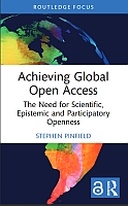Explore

Achieving Global Open Access explores some of the key conditions that are necessary to deliver global Open Access (OA) that is effective and equitable. Often assumed to be a self-evident good, OA has been subject to growing criticism for perpetuating global inequities and epistemic injustices. It has been seen as imposing exploitative business and publishing models and as exacerbating exclusionary research evaluation cultures and practices. Pinfield engages with these issues, recognising that the global OA debate is now not just about publishing business models and academic reward structures, but also about what constitutes valid and valuable knowledge, how we know, and who gets to say. The book argues that, for OA to deliver its potential, it first needs to be associated with ‘epistemic openness’, a wider and more inclusive understanding of what constitutes valid and valuable knowledge. It also needs to be accompanied by ‘participatory openness’, enabling contributions to knowledge from more diverse communities. Interacting with relevant theory and current practice, the book discusses the challenges in implementing these different forms of openness, the relationships between them, and their limits. Achieving Global Open Access is essential reading for academics and students engaged in the study of Library and Information Science, Open Access and Publishing. It will also be valuable and interesting to library and publishing professionals around the world.
This book is included in DOAB.
Why read this book? Have your say.
You must be logged in to comment.
Rights Information
Are you the author or publisher of this work? If so, you can claim it as yours by registering as an Unglue.it rights holder.Downloads
This work has been downloaded 22 times via unglue.it ebook links.
- 22 - pdf (CC BY) at Unglue.it.
Keywords
- Business & Industry
- Economics
- Finance
- Humanities
- Reference & Information Science
Links
DOI: 10.4324/9781032679259Editions

